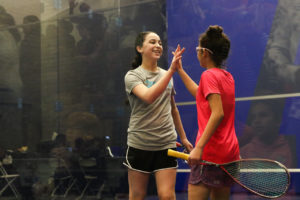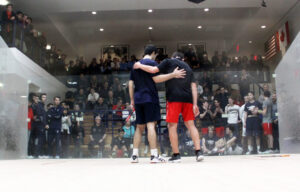Sportsmanship & Character
 “Conduct yourself on court as if you have a job interview with your opponent after the match.”
“Conduct yourself on court as if you have a job interview with your opponent after the match.”
The US Squash Code of Conduct exists to elevate and maintain the high standard of sportsmanship in competition, enhance the enjoyment and safety during play, and are aligned with US Squash’s values of courtesy, fairness and respect.
Being part of the US Squash community is a privilege. Whether one is serving as a volunteer, participating, coaching, officiating or simply attending an accredited US Squash activity, the integrity of the game is of paramount importance and requires agreement and adherence to the Code of Conduct.
As a competitor, being respectful of one’s opponent and the officials, courteous on and off the court, and responsible for one’s own behavior are the fundamentals of competing in a sportsmanlike manner and upholding the integrity of the sport.
Unique to squash, the difference between winning and losing fairly is in the hands and control of each player, regardless of the officials involved.
OFFICIATING CALLS SUCH AS LETS AND STROKES ARE ALMOST NEVER 100% “RIGHT”.
Calls by officials cannot be controlled. The only element one can control is how to react, whether you’re a competitor, coach, parent or fan.
 Competitors must balance many elements which are ultimately only in the control of each individual: sportsmanship with the desire to win; courtesy and respect with raw determination; fair play and while testing limits physically and mentally.
Competitors must balance many elements which are ultimately only in the control of each individual: sportsmanship with the desire to win; courtesy and respect with raw determination; fair play and while testing limits physically and mentally.
Preserving the integrity of squash, the true essence of the sport, relies on everyone involved in the game to be courteous, respectful and responsible for his or her own behavior.
We all—US Squash, players, parents, and coaches—have a joint responsibility to uphold the Code of Conduct and standards of sportsmanship that make squash unique, and our experiences in the sport so valued. Adhering to these expectations will help ensure everyone’s compliance with the Code of Conduct.
Expectations for players – Safety, Fair Play, and Good Sportsmanship
Expectations for Parents, Coaches, Family Members, and Spectators
Enforcement of the Code of Conduct
 Encouraging and recognizing good sportsmanship are important actions to elevating conduct in the community. In addition, ensuring there are appropriate consequences for violations to the Code of Conduct and expectations is also necessary.
Encouraging and recognizing good sportsmanship are important actions to elevating conduct in the community. In addition, ensuring there are appropriate consequences for violations to the Code of Conduct and expectations is also necessary.
As such, US Squash will recognize acts of good sportsmanship more regularly and broadly and act more assertively when there are violations to the Code of Conduct.
What does this look like?
- Posters and available at US Squash Facility Affiliates and at accredited tournaments to remind players, parents, and coaches of expectations
- Materials will include QR codes to make easier the reporting acts of good sportsmanship and violations to the Code of Conduct.
- Match referees are expected to more strictly enforce conduct standards as outlined in Rule 15 and discipline players for violations.
- Specifically, markers and referees should automatically apply the escalating consequences of “Conduct Stroke”, “Conduct Game”, and “Conduct Match” to any player violating any of these four standards.
-
-
- Influencing the referee – Questioning, explaining complaining, or arguing with a marker or referee about a “let”, “stroke”, or “no let” call in an effort to change or influence a decision that has been made.
- Celebrating excessively – Excessive cheering, especially when directed towards your opponent in a way that distracts or intimidates.
- Throwing a racquet – Banging a racquet against the wall or floor, or intentionally breaking a racquet.
- Late to court – Players receive 90-seconds between each game and must be on court, ready to resume play at the conclusion of the 90-seconds period.
-
SPORTSMANSHIP RESOURCES
Click on the poster to download/print/save.
